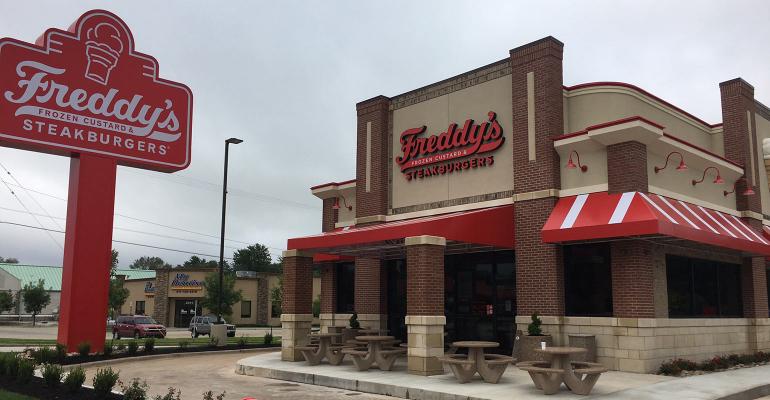Freddy’s Frozen Custard & Steakburgers has quietly been one of the fastest growing chains in the country.
But the Wichita, Kan.-based chain ran into some trouble last year, when its same-store sales growth sputtered. That was tough for a company used to nearly uninterrupted growth since it was founded in 2002.
“Our AUV was down about $30 per store,” cofounder Randy Simon said in an interview. “We were used to just a solid straight line up the ladder. That was a disappointment for us. And in the first six months of the year, we’ve been down, also.”
For Freddy’s, the downturn came at an especially difficult time: The chain’s former CEO, co-founder and Simon’s brother, Bill Simon, passed away in December following a year-long battle with cancer.
“It’s tough,” Randy Simon said. “It was a little over a year ago that he was diagnosed. Scott (Redler, another of the brand’s cofounders) and I gave him a mandate: You go fight your health battle. He spent time at Anderson in Houston and Sloan Kettering in New York. He spent a lot more time with his family. That’s what he needed to do the last seven months.”
The company in the meantime split up Bill Simon’s duties. “Everybody pitched in and knew it was the right thing,” Randy Simon said.
“We miss his thinking,” he added. “We miss his processes, his analytics. There was something about him, a characteristic that’s absent every day we do business. I feel like we’ve learned from him in the 14 and a half years we’ve been together — and me, all but seven years of my life.”
One week later, Randy’s longtime business partner, Howard Wilkins, passed away after his own illness.
The two deaths led Randy to reconsider his continued ownership in Original Bread Co., an early franchisee of Panera Bread. This summer, Original Bread was sold to Flynn Restaurant Group.
“We had to consolidate,” Simon said. “It worked well that Greg [Flynn, CEO of FRG] was interested. He is an outstanding operator.”
The sale was a major milestone for Simon, who has been in the restaurant business for 42 years as a franchisee, with Pizza Hut and with Panera. “I’ve paid royalties all my life,” he said. “This is the first month I haven’t paid it since 1974.”
 But it’s allowed him to focus solely on Freddy’s. The Simon brothers, their father Fred, along with Redler opened the first Freddy’s unit in West Wichita in 2002. The concept proved popular, and the foursome opened a second location seven months later.
But it’s allowed him to focus solely on Freddy’s. The Simon brothers, their father Fred, along with Redler opened the first Freddy’s unit in West Wichita in 2002. The concept proved popular, and the foursome opened a second location seven months later.
Freddy’s system sales grew 70 percent to $340.5 million in 2016, according to NRN Top 200 data, making it among the fastest growing large chains in the country. Unit count has doubled since 2014, to 271.
While the chain’s unit volumes fell last year for the first time in the company’s history, Randy Simon said those sales have started to rebound more recently. “It’s starting to turn a corner the last five or six weeks,” he said. “There’s just a lot of issues out there, working against our segment.”
To be sure, Freddy’s was hardly alone last year and in the early part of this year. Same-store sales industry-wide took a stumble in 2016 and in the first part of this year, amid an uncertain environment. Complicating matters for burger chains such as Freddy’s is the resurgence of the Big Three burger chains: McDonald’s Corp., The Wendy’s Co. and Restaurant Brands International Inc.’s Burger King brand.
The challenges have the company rethinking some of its previously quiet nature. The company just recently got involved with a public relations group and is working to change its marketing programs. “We just quietly build out our business,” he said. “We felt that was the best thing for us to do, to mind our store and let everything fall where it might.”
And despite the recent challenges, operators keep building. Freddy’s is mostly franchised, and many of the chain’s longer-time operators are adding to their territories. “I don’t think any of these early developers or any of the more recent operators would be building stores at this pace if return on capital wasn’t what they’d hoped for.”
Randy Simon said the chain’s status as a relative newcomer, along with his franchised background, works in Freddy’s favor.
“With unlimited white space, we can grant fairly decent sized territories to developers interested in those specific markets,” he said. “We were able to carve off some pretty good territories.” Good franchisees want large territories they can develop and control.
He also said the company tries to “soften as much as we can” while still protecting the brand.
“We have to have pieces in place to protect the brand,” Simon said. “That doesn’t mean you have to be nasty about it.”
His franchising background also comes into play when the company looks to get sales back up.
“One trigger we will not pull is the value trigger,” he said. “We serve value in our food, not in our price.”
That means there’s no response to dollar drinks or 2-for-1 burgers. “We’re not going to be able to fight that,” he said.
“It’s not tempting,” he added. “Discounting is not a good avenue to pursue. When I was a Pizza Hut franchisee between 1975 and 2007, we did a lot of price antics that I think hurt that system and hurt that brand. We sort of turned pizza into a commodity.”
Contact Jonathan Maze at [email protected]
Follow him on Twitter at @jonathanmaze

